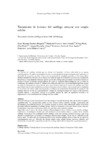Tratamiento de lesiones del cartílago articular con terapia celular

Ver/
Use este enlace para citar
http://hdl.handle.net/2183/19917
A non ser que se indique outra cousa, a licenza do ítem descríbese como Creative Commons Attribution-NonCommercial-NoDerivs 4.0 International Licence (CC-BY-NC-ND 4.0)
Coleccións
- Investigación (FCS) [1293]
Metadatos
Mostrar o rexistro completo do ítemTítulo
Tratamiento de lesiones del cartílago articular con terapia celularTítulo(s) alternativo(s)
Treatment of Joint Cartilage Lesions with Cell TherapyAutor(es)
Data
2008-11-13Cita bibliográfica
Fuentes-Boquete IM, Arufe Gonda MC, Díaz Prado SM, Hermida Gómez T, de Toro Santos FJ, Blanco garcía FJ. Tratamiento de lesiones del cartílago articular con terapia celular. Reumatol Clin. 2008;Suppl 3:S63-S69.
Resumo
[Resumen] Las lesiones del cartílago articular que no afectan a la integridad del hueso subcondral no se reparan espontáneamente. El carácter asintomático de estas lesiones propicia la progresiva degeneración articular y el desarrollo de un proceso artrósico. Para evitar la necesidad de reemplazo protésico, se han desarrollado distintos tratamientos celulares con el objetivo de fomar un tejido de reparación con estructura, composición bioquímica y comportamiento funcional iguales que los del cartílago articular natural. Las técnicas basadas en facilitar el acceso al sistema vascular generan un tejido de reparación fibrocartilaginoso que no reúne las condiciones del cartílago articular. El implante de condrocitos autólogos y la mosaicoplastia autóloga aportan un tejido de reparación de mayor calidad, pero ambas técnicas implican la escisión de cartílago sano, bien para obtener una elevada cantidad de condrocitos, bien para extraer cilindros osteocondrales que se implantan en el defecto. Las células madre mesenquimales constituyen una prometedora herramienta de reparación del cartílago articular en fase de experimentación. Aunque las estrategias actuales de terapia celular producen mejorías clínicas y funcionales, todavía no es posible generar un tejido de reparación resistente a la degeneración y con características de cartílago articular normal. [Abstract] Articular cartilage lesions which do not affect the integrity of subchondral bone, they are not able to repair it expontaneously. The asymptomatic nature of these lesions induces articular cartilage degeneration and development of an arthrosic process. To avoid the necessity to receive joint replacement surgery, it has been developed different treatments of cellular therapy which are focused to create new tissues whose structure, biochemistry composition and function will be the same than native articular cartilage.
Approaches used to access the stream produce a fibrocartilaginose tissue which is not an articular cartilage. Implantation of autologous chondrocytes and autologous mosaicplasties induces a quality better articular cartilage. Furthermore both techniques involve damage in the sane cartilage; because of trying to get a big amount of chondrocytes or because of extraction osteochondral cylinder which will be implanted in the injured joint. The stem cells are a promising toll to repair articular cartilage, however they are in a previous experimentation step yet. Although the present studies using cellular therapy improves clinically and functionally, it is not able to regenerate an articular cartilage which offer resistance the degeneration process
Palabras chave
Cartílago articular
Terapia celular
Lesiones focales de cartílago
Artrosis
Condrocito
Célula madre
Articrapy cartilage
Cell therapy
Focal cartilage lesions
Osteoarthritis
Chondrocyte
Stem cell
Terapia celular
Lesiones focales de cartílago
Artrosis
Condrocito
Célula madre
Articrapy cartilage
Cell therapy
Focal cartilage lesions
Osteoarthritis
Chondrocyte
Stem cell
Descrición
Monográfico Osteoartritis
Versión do editor
Dereitos
Creative Commons Attribution-NonCommercial-NoDerivs 4.0 International Licence (CC-BY-NC-ND 4.0)
ISSN
1699-258X
1885-1398
1885-1398






